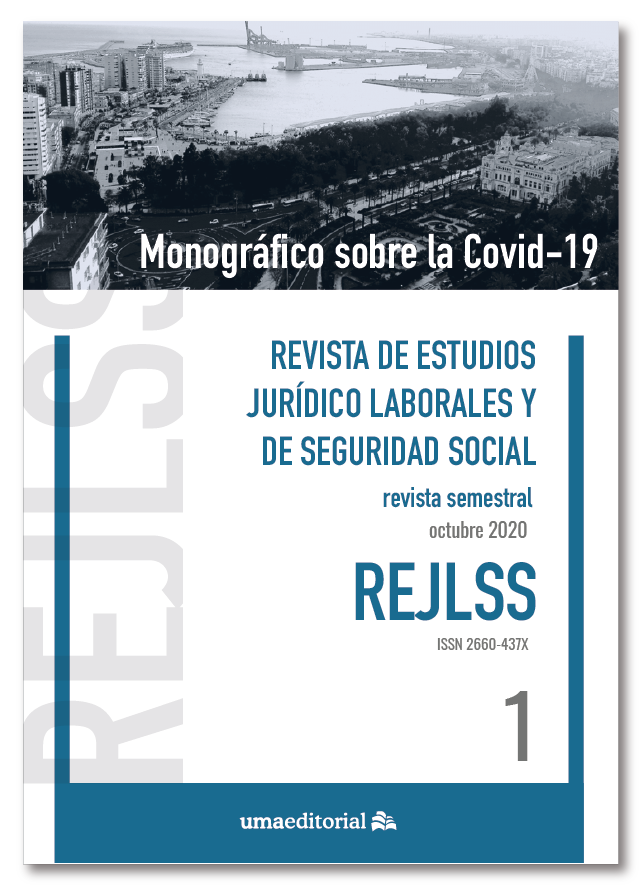Employment temporary adjustment procedures due to COVID-19
An institutional commitment to the preservation of employment in times of pandemic
DOI:
https://doi.org/10.24310/rejlss.vi1.10414Keywords:
Covid-19, suspensión of contract, reduction of working time, employmentAbstract
Social legislation derived from the state of alarm is intended to minimize the impact of COVID-19 on the business fabric and on employment. In this context of sanitary, social and economic crisis, alluvial normative production has been registered, with a succession of provisions of different rank and origin which introduce new measures or extend, modify or reinterpret others previously adopted, in order to adapt them to the changing demands from the emergency situation caused by the coronavirus.
The purpose of this essay is to analyze the institution of suspensión of contract and reduction od working timne due to force majeure or objective causes related to Covid-19, a central piece of social law generated during the pandemic, leaving out of the study the treatment of unemployment protection.
Downloads
Metrics
Publication Facts
Reviewer profiles N/A
Author statements
Indexed in
-
—
- Academic society
- N/A
- Publisher
- Universidad de Málaga. UMA Editorial
References
Calvo Gallego, J., “Presentación de los comentarios a las medidas sociolaborales ligadas a la crisis sanitaria”, Blog Trabajo, Persona, Derecho y Mercado, 2020, http://grupo.us.es/iwpr/2020/04/02/presentacion-de-los-comentarios-a-las-medidas-sociolaborales-ligadas-a-la-crisis-sanitaria/.
Calvo Gallego, J., “El tratamiento de los ERTE durante la actual crisis sanitaria”, Blog Trabajo, Persona, Derecho y Mercado, 02.04.2020, http:// http://grupo.us.es/iwpr/2020/04/02/el-tratamiento-de-los-erte-durante-la-actual-crisis-sanitaria/.
Camas Rodas, F., “Claves y curiosidades del Real Decreto-ley 18/2020 en defensa del empleo”, 13.05.2020, blog del autor Sobre Derecho del Trabajo, Inmigración y propuestas culturales, https://www.ferrancamas.com/blog-derecho-laboral-inmigracion/claves-decretoley/ia431.
Casas Baamonde, Mª.E., “La primera norma del Derecho del Trabajo y de la Seguridad Social en la emergencia del desconfinamiento. Las modificaciones del Real Decreto-Ley 18/2020, de 12 de mayo, de Medidas Sociales en Defensa del Empleo”, Diario La Ley, Nº 9640, Sección Tribuna, 26 de Mayo de 2020.
Fernández Avilés, J.A., “¿Es suficiente este derecho laboral excepcional «por aluviones» frente a la pandemia del COVID-19”, Trabajo y Seguridad Social. CEF, núm. 445, 2020, págs. 7-26.
Gómez Abelleira, F.J., “La duración de los contratos temporales en suspensión por erte”, Foro de Labos, 31.03.2020, https://forodelabos.blogspot.com/2020/03/la-duracion-de-los-contratos-temporales.html.
Mercader Uguina, J.R., “El silencio administrativo positivo y ERTES por fuerza mayor: la negra sombra del Barón de Rothschild”, Foro de Labos, 01.04.2020, https://forodelabos.blogspot.com/2020/04/el-silencio-administrativo-positivo-y.html .
Molina Navarrete, C., “COVID-19 y arte de lo jurídicamente posible: del estrés legislativo al colapso interpretativo”, Trabajo y Seguridad Social. CEF, núm. 446, 2020, págs. 5-30.
Nieto Rojas, P., “COVID-19 y ERTES por causas económicas: ¿con quién negocia la empresa? nuevamente más incertidumbres que certezas”, Foro de Labos, 30.03.2020, https://forodelabos.blogspot.com/2020/03/covid-19-y-ertes-por-causas-economicas.html.
Nieto Rojas, P., “Sobre la comisión para negociar ERTES: ¿podrán los sindicatos atender tanta demanda?”, Foro de Labos, 22.05.2020, “https://forodelabos.blogspot.com/2020/05/sobre-la-comision-para-negociar-ertes.html.
Rojo Torrecilla, E., “Emergencia sanitaria y legislación laboral. Primeras notas sobre el Real Decreto-ley 9/2020, de 27 de marzo, por el que se adoptan medidas complementarias, en el ámbito laboral, para paliar los efectos derivados del COVID-19”, 2020, blog del Autor, http://www.eduardorojotorrecilla.es/2020/03/emergencia-sanitaria-y-legislacion.html.
Rojo Torrecilla, E., “Emergencia sanitaria y legislación laboral. ERTES “de transición” y “de rebrote”, y más medidas de apoyo al empleo autónomo. Notas a propósito del Real Decreto-ley 24/2020, de 26 de junio de medidas sociales de reactivación del empleo y protección del trabajo autónomo y de competitividad del sector industrial”, blog del Autor, http.// http://www.eduardorojotorrecilla.es/2020/06/emergencia-sanitaria-y-legislacion_28.html.
Sempere Navarro, A-V., “El Derecho laboral, la pandemia y las preposiciones”, Actualidad Jurídica Aranzadi, Núm. 964, 25 de junio de 2020.
Taléns Visconti, E. E., “Análisis de las medidas de Seguridad Social adoptadas por el Gobierno de España en relación con la crisis del COVID-19”, Trabajo y Seguridad Social. CEF, núm. 445, 2020, págs. 121-145.
Todolí, A., “Consecuencias de incumplir el compromiso de mantenimiento del empleo de 6 meses para los que se acogen al ERTE”, 26.03.2020, blog del Autor Argumentos en Derecho Laboral, https://adriantodoli.com/2020/03/26/consecuencias-de-incumplir-el-compromiso-de-mantenimiento-del-empleo-de-6-meses-para-los-que-se-acogen-al-erte/.
Downloads
Published
How to Cite
Issue
Section
License
In the Revista de Estudios Juridico Laborales y de Seguridad Social (REJLSS) we are clearly committed to a policy of open access to scientific knowledge (See Berlin Declaration).
Those authors who have publications with this journal accept the following terms:
This journal provides immediate free access to its content under the principle of making research freely available to the public. All the contents published in the REJLSS are subject to the Creative Commons license
Attribution-NonCommercial-NoDerivatives 4.0 International (CC BY-NC-ND 4.0)
Copyrights are of two kinds: moral and patrimonial. Moral rights are perpetual, inalienable, non-transferable, inalienable, unattachable and imprescriptible prerogatives. In accordance with Spanish copyright legislation, the authors who publish in REJLSS retain the moral right over their work, as well as the ownership of the patrimonial right, which will be transferred to the University of Malaga for its dissemination in open access.
The patrimonial rights, refer to the benefits that are obtained by the use or disclosure of the works. REJLSS is published in open access and is exclusively authorized to perform or authorize by any means the use, distribution, dissemination, reproduction, adaptation, translation or transformation of the work.
It is the responsibility of the authors to obtain the necessary permissions of the images that are subject to copyright.
Authors whose contributions are accepted for publication in this journal retain the non-exclusive right to use their contributions for academic, research and educational purposes, including self-archiving or depositing in open access repositories of any kind.
The electronic edition of this magazine is edited by the Editorial of the University of Malaga (UmaEditorial), being necessary to cite the origin in any partial or total reproduction.
The authors may adopt other non-exclusive license agreements for the distribution of the version of the published work (eg: deposit it in an institutional telematic archive or publish it in a monographic volume) provided that the initial publication is indicated in this magazine.
Authors are allowed and recommended to disseminate their work through the Internet (eg, in institutional telematic archives or on their website) before and during the submission process, which can produce interesting exchanges and increase citations of the published work.







19.png)
